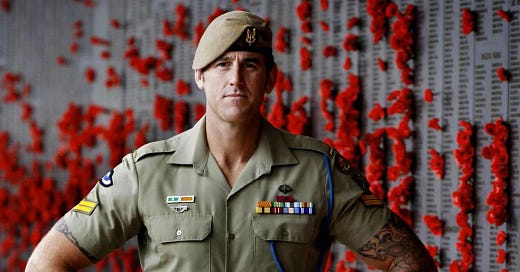By George Hazim
His presence would demand attention. If it wasn’t his imposing figure, it was his aura as a war hero – Ben Roberts-Smith’s (BRS) proximity commanded it – that’s what comes with being a Victoria Cross winner.
But now, Roberts-Smith is far from what he’s perceived to be. The once powerful warrior is crestfallen, and the dial of his status has turned from hero to zero.
The legend, this week, was found to be anything but, and Justice Anthony Besanko’s June 1, civil defamation ruling involving the Sydney Morning Herald, The Age and Canberra Times was a devastating blow for Roberts-Smith’s reputation.
Besanko’s decision deemed Roberts-Smith, even if not through intent, a war criminal.
On the surface there may not be enough evidence to conclude he acted unlawfully during his time in Afghanistan, that doesn’t mean he’s fully cleared, or further evidence won’t come to light, that requires a criminal trial, what is certain is the public’s perception of Roberts-Smith has changed forever.
Roberts-Smith won a Victoria Cross because his previous actions on the battlefield through selfless acts of bravery earned him the military’s top award, but now a dark cloud of suspicion hangs over him.
As a VC winner, Roberts-Smith has enjoyed a special kind of status where his heroics and valor helped create Australia’s own version of Ares, the Greek God of War, and the son of Zeus.
Ben Roberts-Smith like Ares was revered as the model soldier and a paragon of manly virtue – Roberts-Smith was Australia’s own Ares.
Ares was worshipped, by the Mycenaean Greeks and Roberts-Smith by Australians.
Since the joint ABC Sydney Morning Herald investigation into Roberts-Smith alleged war crimes after the former Minister for Defence in the Morrison Government and SAS troop commander, Andrew Hastie, outed Roberts-Smith, BRS’s life has been embroiled in legal battles and scrutiny from the media and the public. It's been a war of a different kind for Roberts-Smith.
The Hall of Valor at the Australian War Memorial honors the 101 Australians who’ve received the Victoria Cross along with the nine Australian Defence personnel who have received the George Cross - special men who because of their bravery are special types of heroes.
Winning the Victoria Cross has afforded Roberts-Smith a life of privilege, contrary to the other 100 Australian soldiers, awarded the VC for their acts of valor in the face of the enemy – they decided to fade into anonymity – retiring to lead a quieter life, but Roberts-Smith’s decision has been different.
Anonymity for them was their way to find peace, but for Roberts-Smith, he appears to crave the limelight and adulation. He seemingly chased it and traded off on it.
He was if he didn’t see or promote himself as the ADF’s poster boy.
No matter what or how Roberts-Smith’s motivations are defined, his book deals, speaking engagements, executive position at Seven, consultancy roles, television appearances and the list goes on, have seen him profit off his VC – no other VC winner has endured financial benefits like Roberts-Smith has.
Victoria Cross medalists through their valor, are elevated to another status. They are men who have earned the right to be held in a league of their own.
The demands and expectations of what is asked of soldiers in battle most people would struggle with. But they do it. Victoria Cross winners are heroic – and being heroic comes with connotations and a perception of fairness.
If the allegations about Roberts-Smith are true, then he’s not a hero and he’s brought what the Victoria Cross represents and what it means to win a VC into disrepute.
On that fateful day in September 2012, the Afghan village of Darwan became a war crime scene and a suspecting place of hell for its occupants.
When Ali Jan awoke that morning, he would have anticipated spending another day, going about his daily routine as a farmer, not thinking he would meet his fate by being allegedly handcuffed and kicked over a cliff by Roberts-Smith.
Or instructions to some of his men to allegedly strangle some unarmed villagers with their bare hands or have another SAS operative shoot another unarmed man in a ditch.
The village of Darwan became a killing field and there were no heroes there except for alleged murderers and war criminals, and the loss of what it means to be a VC winner.
Whatever happened in the village of Darwan, a criminal investigation is needed and the ADF must act quickly. If Roberts-Smith is guilty, then he must be stripped of his VC and the VC must be allowed to remain a medal awarded only to those who ascend to the virtues of which it represents.





Well said!
Too true! What a shame to the honor of the VC. Couldn't agree with you more.